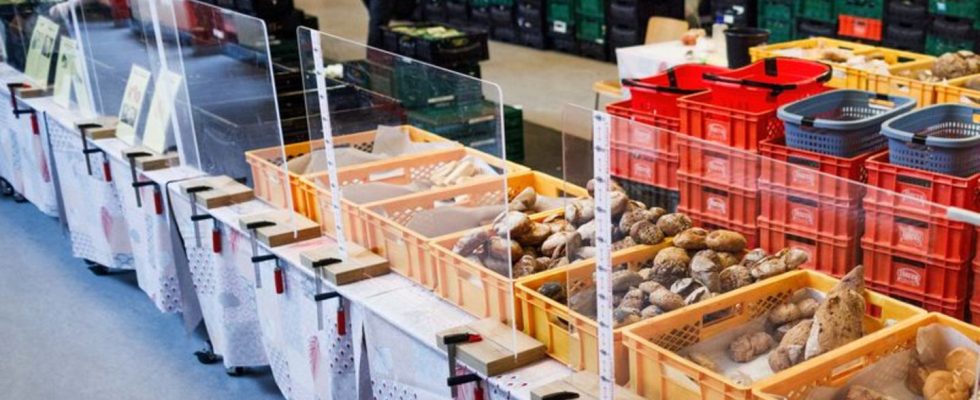Tafeln have been helping poor people for 30 years. The shops are financed by donations. Can their state independence continue to exist even if more people have to reach for cheap goods?
The panels against poverty and food waste see themselves at the limit: long queues in front of the shops, stops at customers, high infrastructure costs. The number of people from the middle class who are dependent on cheap food is growing. “The panels are a seismograph for social changes,” says Sabine Werth, who founded Germany’s first panel 30 years ago in Berlin and has chaired the panel ever since.
At their national meeting from July 6th to 8th in Mannheim, the Tafel delegates will elect a new board. The chairman, Jochen Brühl, is no longer standing after ten years. The change in leadership comes at a time when food banks are becoming increasingly important in the fight against poverty.
What do you get at the panels?
Helpers collect surplus groceries in shops, bakeries and restaurants and bring them to the food banks. The goods come from stocks, returns and overproduction. Products with a short best-before date or cosmetic defects are also picked up. The offer for the customers of the Tafel can range from fruit and vegetables to baked goods and dairy products. Durable goods such as pasta or rice are donated less frequently.
Who visits the panels?
More and more people are coming who have lost their job due to Corona, are on short-time work or had to give up their self-employment. “Their savings have been used up, so they come to us,” says Werth. Actually, food banks are intended to relieve the budget so that people can afford to go to the cinema or to a concert. Now the focus is on the food.
How do unemployment initiatives rate the development of the panels?
From the point of view of the Association for the Promotion of Trade Union Unemployment, it is a scandal that private organizations such as the Tafel have to provide the state-guaranteed subsistence level as a stopgap. “For many people, the panels are the last lifeline,” says speaker Rainer Timmermann. Even after an increase of 50 euros, the citizen’s income is not enough to live on due to increased inflation and electricity prices.
How are the user groups developing?
The increase in users on short-time work, recipients of unemployment benefit II and pensioners was around one third each in 2021. On the other hand, according to further information from the association Tafel Deutschland, the number of asylum seekers fell by almost a quarter. About a quarter of the customers were children and seniors.
As a result, two million customers took advantage of the offer in 2022. The panels only reach a small proportion of the 15 million people in Germany who are at risk of poverty. “That’s why criticism of a ‘shaming of society’ that conceals the withdrawal of the welfare state is complete nonsense,” says Werth.
Where does the table idea come from?
Two things coincided: a newspaper report on the City Harvest organization in New York, which distributed surplus food to the homeless, and a lecture by the then Social Senator Ingrid Stahmer (SPD) on homelessness in Berlin. Both shook up the initiative group of Berlin women, including Sabine Werth. “At that time, the statement by the Kohl government was that there was no poverty in Germany and that everyone received adequate benefits,” says the 66-year-old. She and a handful of fellow campaigners saw things differently and asked companies based on the US model for donations of food that could not be sold but was still edible. This resulted in almost 970 panels with 60,000 volunteers.
Who is allowed to serve at the blackboards?
Not only the homeless, but also people who can prove their need by means of a job centre, pension or student loan notification receive a Tafel identity card. The umbrella organization states that the gross poverty threshold is EUR 1,251 per month for a single household and EUR 2,627 for a household with two adults and two children under the age of 14.
There are differences in detail: In Berlin, anyone who has less than 800 or 900 euros a month at their disposal – depending on the issuing office – can benefit from food banks; one or two euros are due for each purchase. Mannheim customers, for example, pay a maximum of one third of the usual retail price for the individual goods. In Frankfurt, you pay one euro for each bag you take with you. The opening frequency and length as well as the product range also depend on the local conditions. “We’re not a supermarket,” says umbrella organization spokeswoman Anna Verres.
How much is donated to the Tafel?
According to the Food Trade Association, companies donate 74,000 tons of food to food banks every year. But that’s more of a drop in the bucket: according to the umbrella association of food banks, 18 million tons of food end up in the garbage every year, half of which is still edible. In supermarkets, the amount of donations is declining, as they are more aware of the problem of surpluses. “The moral hurdle for throwing something away has increased,” says Verres.
On the other hand, the infrastructure for picking up food from the manufacturer will be further expanded. This requires refrigerated vehicles and regional deep-freeze warehouses, the operation and purchase of which can hardly be managed by the Tafel, which are financed almost exclusively from donations. Some federal states granted crisis funds. Permanent state funding is not taboo for Verres. With such small sums, there is no threat of government appropriation.
What is the significance of the elections of the association leadership?
Werth, on the other hand, categorically rejects state funds. The election of the new association leadership is a choice of direction, she says. It is about nothing less than the independence of the citizens’ movement.

